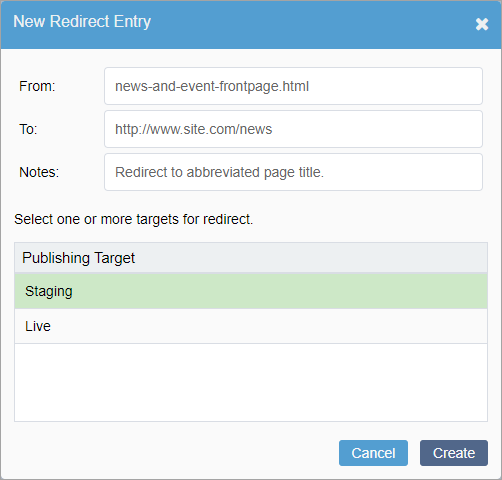Redirects
Administrators can create mappings between page requests received by the CMS and particular pages in the site. It provides the equivalent of custom "301" mapping within the CMS.
The Redirects feature allows a site to preserve a popular URL, perhaps a bookmarked page or one tagged by search engines, and redirect a browser to a new page. It also lets a user request an abbreviated page title (e.g., http://www.site.com/news) and receive the page without typing the full name (e.g., http://www.site.com/news_and_event_frontpage.html).
To create a new redirect:
- Click Add.

- Complete the fields on the New Redirect dialog that displays.

- The values entered in the From and To fields create a map between the page requested (From) and the site page that will be delivered (To). The content of the From field is appended to the URL of the site. If that combined address matches an HTTP request, the page in the To field is delivered. This is true even if structured URLs are enabled. The To field may hold a specific XID (e.g. x217.xml) or a structured URL label (e.g. About_Us) if structured URLs are enabled.
- You can add a note about the redirect in the Notes field.
- At the bottom of the dialog box, select one or more publishing targets where the redirect will apply.
- When you're finished, click OK.
Formatting Redirects
If your site uses redirects, it's important to understand the significance of the trailing slash '/' in the From and To fields. A From field that ends with a slash matches only complete strings. For instance:
This example maps [site]/news, [site]/news/, and [site]/news/today to page x220.xml. It would not match [site]/news_articles since the key element of the request (news_articles) does not exactly match the field (news).
A leading slash in the From field provides a wildcard match at the folder level. However, partial matches aren't supported-this example would provide a match for [site]/news/, but not [site]/news_article.
A leading slash in the To field has a similar effect.
In this case, /promotion/page1 and /promotion/page2 simply go to /news.
Placing a trailing slash in the To field allows extended path elements to be passed from the From field.
In this example, a request for [site]/news/today will return www.news.com/today.
A leading and trailing slash in the To field also passes these elements.
This redirect will make /promotion/page1 go to /news/page1.
